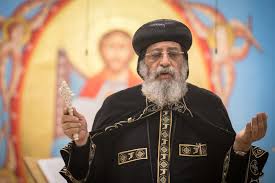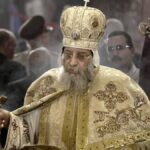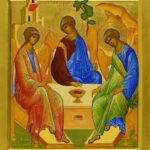I get that the church is a building, but the Orthodox see it differently?
Author: Yitzhak
Today, we look in-depth as to why the church matters to the Christian and how we can utilize it to grow and strengthen our faith.
In a previous article, we discussed what the seven sacraments are and why they are so important. Now we’ll look at the “Church” and what it is all about.
Christ Himself instituted the church while He was down here on earth. He wanted to establish a permanent connection between mankind and Himself so began a narrative whereby we could commune with God (or ‘Break bread’) and each other at the same time as believers. We believe that the Holy Spirit works through the Orthodox church (but is not limited by any means to church services). The God we worship is a ‘God of Love’, so He guides us to love one another as we love ourselves, and this is manifested in Church where we are all equal before Him. This means that He lovingly gives Himself through communion and we are in communion with God, through the power of the Holy Spirit.
Church as Hierarchical Entity by Tradition
Earlier, we spoke about the need for a place to “break bread” or in other words have “liturgy”. This means that the church has a method and rules about mass or ‘liturgy’. The priest can break bread, and the bishop who ordains a priest can also break bread, and this has been a rule since Jesus’ time. This means that the rules/laws, otherwise known as ‘canons’, are the framework of what the “church” looks like.
If you have ever walked into an Orthodox Church, you’ll see the pictures (called Icons), alter, incense and candles in certain places and this is all because the canons in the church dictate where these are situated. Church rules, traditions have become the main staple where the early Christians would congregate together and ‘break bread’.
As you can remember from history, the early Christians were actively hunted and killed. Thus, it becomes a little challenging to openly build church buildings and temples when you’re the state’s number one enemy! The church and its design and details will be discussed in upcoming articles but for now I want to take a moment and also mention that churches are not buildings BUT those who administrate them – THIS is the real “Church”. Christ is the King of the Church, and then seven orders have specific jobs to keep the church running. These seven orders can be summed up into three major categories: the bishops, the priests and then deacons. The Bishop has to be a certain way, the priest has to be a certain way, and the deacon has to be a certain way and so forth according to the canons of the church. Some of it is found in the Bible like in Acts and it passed down through oral tradition and later documented.
An extra note about the early church
So as the disciples came together to pray the mass and they have set the standard for all Christians from then on to do the same. Our ‘Sabbath’ is usually on a Sunday. However, the church doesn’t end on a Sunday. Not at all, it’s meant to be a refresher if you will, where you get spiritually boosted up and then bring the church into the rest of the week.

The Church As A Community
The Orthodox Church should have a massive positive impact on the community. The church accepts everyone from all walks of life where we can all come to Christ as one. We are a community of people who seek God, who voluntarily come to Church on their own volition. Let us make it clear that no one is forced to go to church.
Yo! I went to church once and it wasn’t happy-happy joy-joy
Nobody said though, that we all have to be friends and sing kumbaya all day long and never, ever have any disagreements with anybody. This is not Christianity. Christianity is about loving God as best you can and treating everyone you meet like Christ. As humans, we’re all going to fall, make mistakes and say hurtful things but most importantly is that you repent and then come back to the source water and drink from it again as mentioned in the New Testament. You then make your peace with whatever or whoever is bothering you as much as possible. Sometimes it is not possible to reconcile, but at least genuine attempts have been made, and God will judge you on those attempts. Did you know that the major Saints, Saint Peter – head of the disciples and Saint Paul – the biggest Apostle, often clashed and had many disagreements? Yep! They couldn’t reconcile for ages so much so that they went their own ways for a long, long time before they finally sorted their differences. This is recorded in the Holy Bible.
This tradition is where Paul and James argued about religious topics and had a disagreement. Peter was more the bridge man to bring those two together. They both gave their lives for Christ, and yet they didn’t stand around hugging and singing kumbayah all day. They took the best approach to solve their problems and reconcile together in fear of God. This is important because it sets out our template for how to negotiate with others.
Church the healer
We are human beings. Broken. Torn. Hurt. Sad. All are looking for peace and looking for a good doctor to heal us. We should support each other, and this is also a note to all the Orthodox Christians reading this: We should only rely on God, everything else is a bonus. We should have peace with one another as best we can, and forgive one another as Christ has forgiven us. Easier said than done, we get it – but it can be done.
The Church can also fall into one more category. This one is more focused on doctrine and dogma (theology). Where colloquially, the church can be a haven for hardcore theology and a GPS to navigate the world in modern times. Commonly said, “the church and its wisdom…” refers to the two centuries of wisdom that has been passed down from Christ Himself, to the patriarchs, to the monks. This means that if we have an issue or a problem, we can also go to the church to get the wisdom to solve our problems. Sometimes it’s a firm ‘yes’ or ‘no’, but sometimes it’s a grey area and the understanding, and the church can guide us in finding the right solution.
Conclusion of the church
For this quick fire article, we spoke about the church and the main aspects of what a church is other a physical building to have a liturgy in, but it is the administration: bishops, priests and deacons, the community of people and finally the collective wisdom/healing aspects of the Church.
The church serves many roles in our everyday lives – emphasis on every day – because every day is the most important. How we live our lives today and in the challenging situations is important.
If you have any comments or question, send it to info@orthodoxy.com.au



